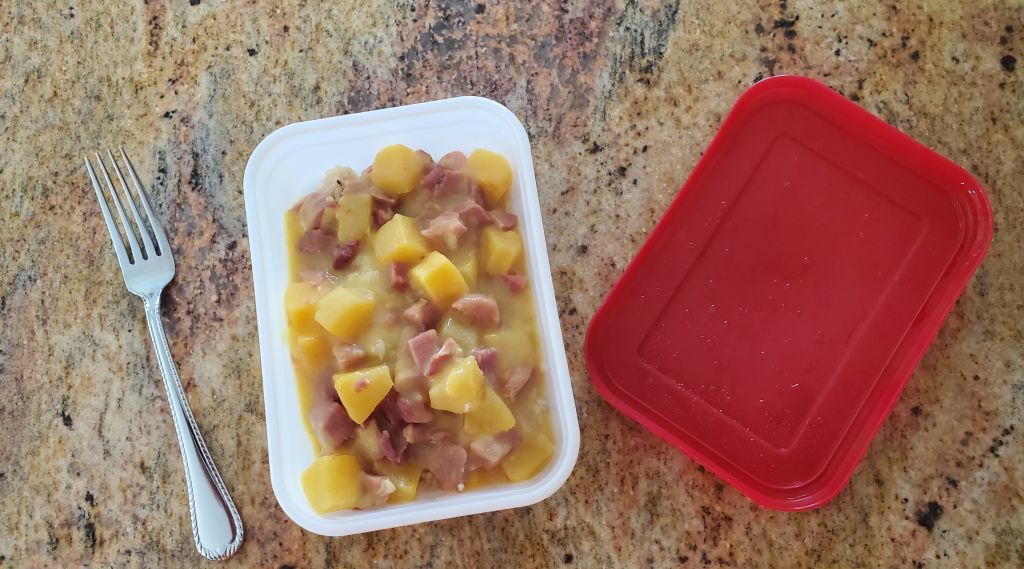Let me begin by taking a poll, and raise your hands good and high: How many of you like leftovers? How many of you do not care for leftovers? (My wife would agree with you.) How many of you could go either way: they’re not preferred but you’d eat them anyway?
Leftovers are those surplus foods that remain unconsumed at the end of a meal. Depending on the situation, the amount of food, and the type of food, leftovers could be saved or even thrown away.
For example, Stephanie and I had pancakes for breakfast yesterday, and I wasn’t sure what to do with the leftover pancake mix. So, I asked her, “Should I throw it away or do you have a batter idea?” (Yeah, it’s not easy to live with me – just saying. My wife is a saint!)
In our gospel today, thousands who followed Jesus to hear him teach were now filled with more food than they can eat. There was such an abundance of leftovers filling 12 wicker baskets – so much that every disciple could have lugged one away and fed even more people. And that’s all thanks to the amazing bounty of Jesus Christ.
But let’s back up a bit. The apostles recognized that the crowd has been there listening to Jesus for a very long time. It was getting late, and the people were getting hungry. Their suggestion was to send them away so that they could find lodging and food on their own. But Jesus issues this key phrase that often gets overlooked. He said, “Give them some food yourselves.” Remember, all they had were a couple of fish and a few loaves of bread, which wouldn’t be very helpful for all those people. But then we know that Jesus takes that minimal offering, blesses it, breaks it, and gives it to the crowd – and they are completely satisfied.
And we also know (or should) that this is a foreshadowing of the Eucharist. But Jesus was also preparing his followers for the Last Supper – that ultimate expression of love where he sacrifices his body and blood. Each of them are not only invited to participate but will also be called to give more.
Jesus offers the hungry crowd (and us) the gift of himself. When we encounter Jesus in the Eucharist, we are then in harmony with Christ’s Spirit of generosity, self-sacrifice, love, and humble service to others. When we consume the Body of Christ, we are given the strength to serve those who hunger for love, justice, peace, and reconciliation. The Lord feeds us with the bread of life and teaches us how we can offer our lives in order to nourish others.
Today, we celebrate The Most Holy Body and Blood of Christ, or Corpus Christi. So, what does that really mean? What exactly is the Body of Christ? It’s a threefold definition. First, it’s the actual, physical body of Jesus. It’s the body that was preaching, teaching, and miracle working, but also the body that was tortured, hung on a cross, and died for us.
 The Body of Christ is also the Eucharist. We encounter Christ most fully, most intimately (body, blood, soul, and divinity) in the real presence of Jesus in the Eucharist under the appearance of bread and wine. When we boldly receive our Lord in the Eucharist, God gives us his entire self to you and to me! St. Paul echoed the words of Jesus in our second reading, “This is my body that is for you.” That means when we consume the host, Christ is in us! Jesus is saying to us, “Let me abide in you and transform you into something even more beautiful.” This transformation of the bread and wine into the Body and Blood of Jesus is meant to transform us from a bunch of imperfect individuals into the Body of Christ so we can become who God made us to be.
The Body of Christ is also the Eucharist. We encounter Christ most fully, most intimately (body, blood, soul, and divinity) in the real presence of Jesus in the Eucharist under the appearance of bread and wine. When we boldly receive our Lord in the Eucharist, God gives us his entire self to you and to me! St. Paul echoed the words of Jesus in our second reading, “This is my body that is for you.” That means when we consume the host, Christ is in us! Jesus is saying to us, “Let me abide in you and transform you into something even more beautiful.” This transformation of the bread and wine into the Body and Blood of Jesus is meant to transform us from a bunch of imperfect individuals into the Body of Christ so we can become who God made us to be.
How do we prepare ourselves to receive the real presence, the Body and Blood of Jesus, in the Eucharist? In Holy Communion, we receive Jesus, who gives himself to us – which is the primary reason why we don’t take communion, but we receive communion.
In the words attributed to St. Cyril of Jerusalem: “When you approach, take care not to do so with your hand stretched out and your fingers open or apart, but rather place your left hand as a throne beneath your right, as befits one who is about to receive the King. Then receive him, taking care that nothing is lost.” (I’m thinking that St. Cyril was left-handed, but if you’re a righty, just do it the opposite.) The core principle is to approach the Eucharist with humility and respect for the sacredness of the sacrament.
Think of it this way: you and I are the Body of Christ, moving forward to receive the Body of Christ who makes us one with himself and with one another.
Lastly, the Body of Christ refers to us, the Church – and each of us has a calling. St. Augustine once said to those about to receive the Body of Christ in the Eucharist: “Be what you see and receive what you are.” This means that the celebration of the Eucharist should increase our love for one another and remind us of our responsibilities toward one another. As members of the Body of Christ, it is our duty to represent Christ and to bring Christ out to the world. You and I are called to be leftovers – to share the Good News not only by our words but also by our actions.
Here’s the thing: we cannot receive Jesus in the Eucharist and remain the same. A transformation needs to take place. We are fed and strengthened so we can be sent out and bring the love of Jesus to others by becoming the bread of life for others.
I think that we often live as if our happiness depends on having or wanting. But true joy, happiness, and peace come from the giving of ourselves to others – that’s where we will find the greatest fulfillment in life.
Let me end with a story…
A certain saint asked God to show her the difference between heaven and hell. So, God sent an angel to take her, first to hell. There she saw men and women seated around a large table with all kinds of delicious food. But none of them was eating. They were all sad.
The saint asked one of them, “Why are you not eating?” And he showed her his hand. A long fork about 4 feet long was strapped to their hands such that each time they tried to eat they only threw the food on the ground. “What a pity” said the saint.
Then the angel took her to heaven. There the saint was surprised to find an almost identical setting as in hell: men and women sitting round a large table with all sorts of delicious food, and with a 4-foot fork strapped to their arms. But unlike in hell, the people here were happy and laughing.
The saint asked one of them, “How come you are happy in this condition?” “You see,” said the man in heaven, “Here we feed one another.”
My sisters and brothers, when we celebrate the Eucharist, what do we do with our leftovers? (And I’m not just talking about the hosts that are placed in the tabernacle.) What talents and gifts do we possess that we can give or share with others? What is God calling us to do in the service of others?
The Body and Blood of Christ is not a one-way gift but one of mutual giving or exchange. Jesus fills us beyond our capacity with his grace and mercy. May we, his disciples, always strive to bring that abundance of God’s love to all the world. Amen.
How can we live as God intended? Find out here.






Thank you for your inspiring words.
Wish I would have had this before I preached this past weekend
Hope all is well with you and your family.
Still can hear your voice from our Retreat weekend.
God Bless